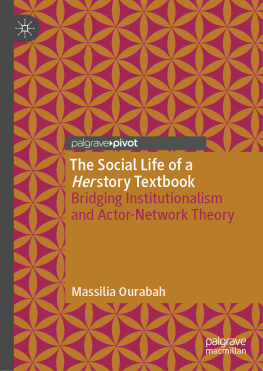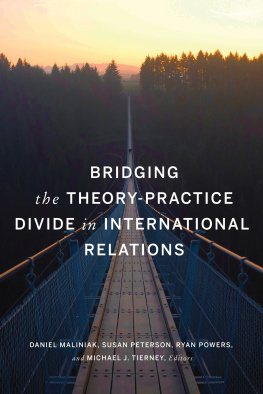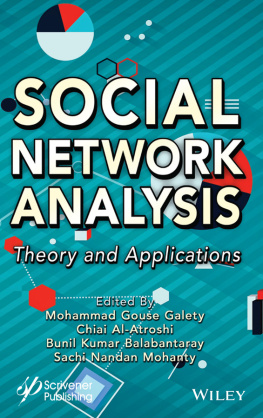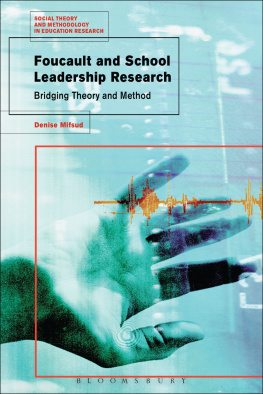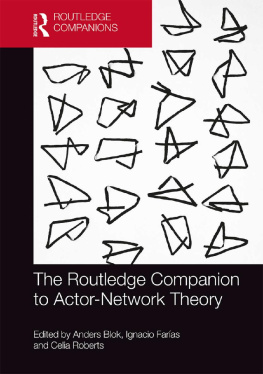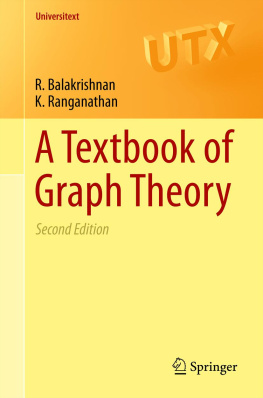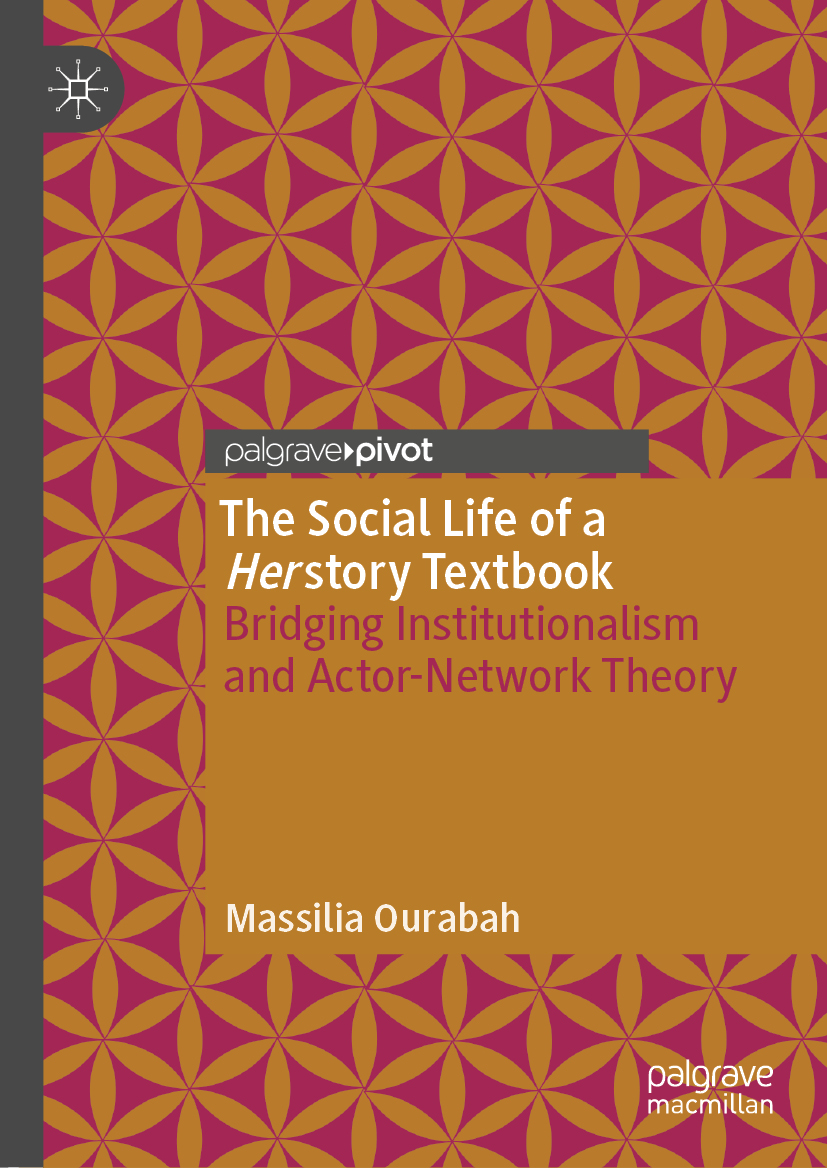Massilia Ourabah
The Social Life of aHerstory Textbook
Bridging Institutionalism and Actor-Network Theory
Massilia Ourabah
Faculty of Philosophy and Social Sciences, Universit Libre de Bruxelles, Brussels, Belgium
ISBN 978-981-15-4357-9 e-ISBN 978-981-15-4358-6
https://doi.org/10.1007/978-981-15-4358-6
The Editor(s) (if applicable) and The Author(s), under exclusive license to Springer Nature Singapore Pte Ltd. 2020
This work is subject to copyright. All rights are solely and exclusively licensed by the Publisher, whether the whole or part of the material is concerned, specifically the rights of translation, reprinting, reuse of illustrations, recitation, broadcasting, reproduction on microfilms or in any other physical way, and transmission or information storage and retrieval, electronic adaptation, computer software, or by similar or dissimilar methodology now known or hereafter developed.
The use of general descriptive names, registered names, trademarks, service marks, etc. in this publication does not imply, even in the absence of a specific statement, that such names are exempt from the relevant protective laws and regulations and therefore free for general use.
The publisher, the authors and the editors are safe to assume that the advice and information in this book are believed to be true and accurate at the date of publication. Neither the publisher nor the authors or the editors give a warranty, express or implied, with respect to the material contained herein or for any errors or omissions that may have been made. The publisher remains neutral with regard to jurisdictional claims in published maps and institutional affiliations.
Cover illustration: Melisa Hasan
This Palgrave Pivot imprint is published by the registered company Springer Nature Singapore Pte Ltd.
The registered company address is: 152 Beach Road, #21-01/04 Gateway East, Singapore 189721, Singapore
The Social Life of aHerstory Textbookis an original and exciting analysis by a hugely promising young scholar. It skillfully and elegantly bridges two theoretical frameworks typically seen as incompatible, and provides a rich ethnographic account of a timely, widely debated issue: how to do justice to gender and womens perspectives in the context of mainstream education?
Prof. Dr. Giselinde Kuipers,Research Professor of Sociology, Catholic University Leuven, Belgium
This is a very important and timely book. It moves beyond the mere observation of the inadequacy of gendered representations in education and asks: how does educational change happen in practice? Next to its empirical contribution, this book ingeniously brings together actor-network theory and the institutionalist sociological tradition. A must read!
Prof. Dr. Jan Willem Duyvendak,Distinguished Research Professor of Sociology, University of Amsterdam, The Netherlands
Acknowledgements
For this book, for helping me grow intellectually, for their wisdom and solicitude, I am indebted to the professors from whom I have learned so much. I wish to thank Dr. Herman Tak for his encouragement and wise advice, as well as my professors from the Research Masters Social Sciences of the University of Amsterdam: Dr. Julie McBrien for being a model of kindness in a fierce academic world and Dr. Oskar Verkaaik for putting his trust in me. Finally, I am forever grateful to Dr. Marguerite van den Berg who has done all this and more, who has guided me, shielded me from drowning in self-doubt, and without whom this book would not exist. Thank you for everything Marguerite.
Ce livre naurait pas non plus vu le jour sans la prcieuse contribution des membres de lassociation Mnmosyne et de toutes celles et ceux qui ont accept de me rencontrer, de me parler de leur travail, ou de mouvrir leur salle de classe. Cest un chantier considrable que celui de la promotion de lhistoire des femmes et du genre, merci elles dapporter leur pierre ldifice.
Enfin, ce livre doit normment celles et ceux qui ont, dune faon ou dune autre, tenu la plume avec moi. Merci Aleth et Gonzague pour leur bienveillance infinie, merci mes ami.es qui sont mes respirations Solne, Laura, Fripouille , merci ma famille, ma tante et son soutien prcieux, Yanis et Anas que jaime plus que tout, merci mes parents que jespre rendre fiers autant quils me rendent fire, enfin merci CH qui na jamais failli me soutenir, mencourager, et marracher par le rire mes rflexions sociologiques. Jespre rire encore pour des annes venir.
Contents
The Author(s) 2020
M. Ourabah The Social Life of a Herstory Textbook https://doi.org/10.1007/978-981-15-4358-6_1
1. Introduction
Massilia Ourabah
(1)
Faculty of Philosophy and Social Sciences, Universit Libre de Bruxelles, Brussels, Belgium
Massilia Ourabah
Abstract
The introduction contextualises the case study on the textbook La place des femmes dans lhistoire (LPFH). It reflects on the development of women and gender history and notes that this historiography has seldom been incorporated into French primary and secondary educational curricula. It explains the goal of the textbook LPFH to offer a more gender-sensitive narrative to history courses in the context of the French Education Nationale. This ambition aligns with the principles of feminist pedagogy which are briefly discussed. The introduction also describes the social life of things and multi-sited ethnographic fieldwork approach. Finally, it presents the dual structure of the book which offers a version of the story grounded in the inhabited institution literature and another version grounded in actor-network theory.
Keywords
Gender and women history Feminist pedagogy Curriculum reform Social life of things Actor-network theory Inhabited institution
What images do you like best on this cover?
This one, cause I know her from TV, and that one, cause shes pretty.
High school student about the cover of the textbook
La place des femmes dans lhistoire ()
Starting Point: The (Same Old) Representation Problem
I am baffled by my own ignorance. This was my exact thought when I first heard about the procs de Bobigny. The procs de Bobigny was the trial of an underaged girl and the four women who helped her get an abortion after she had been raped in 1971 by one of her schoolmates. That trial had a crucial impact on the decriminalisation of abortion in France, and although I was born and raised in France, I had never heard about it until I was eighteen or nineteen. I remain regularly baffled whenever I encounter a historical event or personality as critical to womens history as they are unfamiliar to me. Yet I went to school, attended history classes, did my homework, and read the assigned literature. So what went wrong? Why is it that Robespierre has been part of my French Revolution imagery for so long, but Olympe de Gouges is only a recent character? My well-attended history classes had to bear some responsibility.
In 1975, the French Secretary of State for the Condition of Women Franoise Giroud commissioned a study on the representation of women in childrens textbooks. The study concluded that these texts conveyed a stereotypical image of economically unproductive women, an image that misrepresented the situation of women in the 1970s (Bousquet ).

